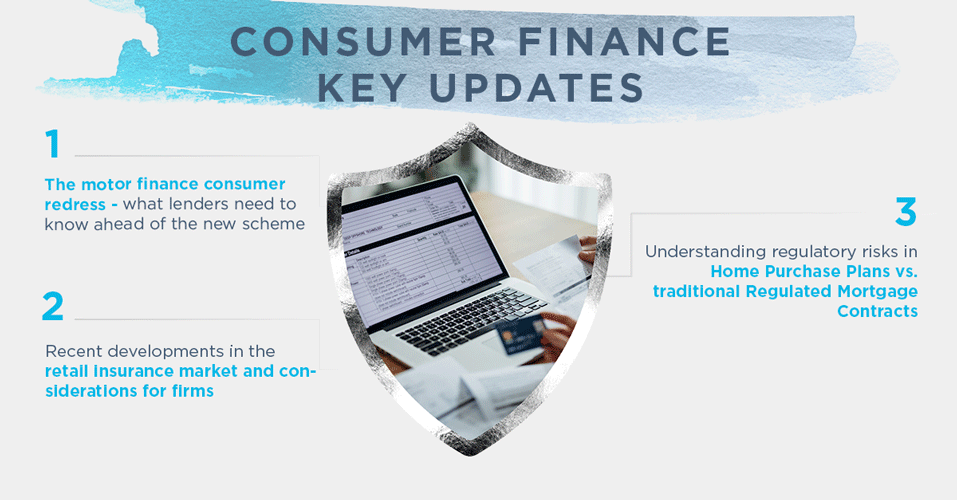On 7 October 2025, the Financial Conduct Authority (FCA) published a statement and consultation paper (CP25/27) on the Motor Finance Redress Scheme. The consultation is published in response to the FCA’s review which found widespread failings on how motor finance firms disclosed commission payments and commercial ties between lenders and brokers.
It also follows the Supreme Court judgment in Johnson v FirstRand Bank Ltd, Wrench v FirstRand Bank Ltd and Hopcraft v Close Brothers Ltd [2025] UKSC 33, which, among other things, examined the unfair relationship provisions in section 140A of the Consumer Credit Act 1974 (CCA), upholding one customer's unfair relationship claim. In the light of the judgment, the FCA states that there is now sufficient legal clarity to move ahead with a compensation scheme.
The FCA is therefore consulting on a redress scheme using its powers under s.404 of the Financial Services and Markets Act (FSMA) for motor finance customers who it considers were treated unfairly. The FCA considers that inadequate disclosure of commission means consumers are less likely to make informed decisions, negotiate or shop around for a better deal. This has led them to a determination that that there have been unfair relationships between lenders and their customers under section 140A of the CCA and that consumers have suffered (or may suffer) loss or damage.
We set out below the key elements of the proposed redress scheme and what is expected of relevant firms in the run up to the launch of the scheme next year. We also share our insights on the considerations for implementation and the operationalisation of the scheme by lenders.
Timeline
The FCA is seeking feedback on the redress scheme proposals by 18 November 2025. Final rules and the policy statement are expected in early 2026, with the scheme launching at the same time and compensation payments starting later in 2026.
What agreements are included in the scheme?
The redress scheme covers regulated motor finance credit agreements from 6 April 2007 to 1 November 2024. It is estimated that 14.2 million agreements – 44% of all agreements made since 2007 will be considered unfair. The scheme will not include consumer hire agreements as s140A CCA does not apply to these agreements. The FCA is also not applying a de minimis threshold which means that low-value cases will still be entitled to redress. It is proposed however that Lenders will be able to offer to settle such low value cases without completing all stages of the scheme.
Opt in / opt out
There are currently just over 4 million complaints with firms. Lenders will be required to contact these customers within 3 months of the scheme starting. These consumers will be included in the scheme unless they opt out. Those who have not complained will be invited to opt in within 6 months of the scheme starting. Consumers who have not been contacted can request a review within one year of the scheme’s start.
Eligibility for compensation
Not all customers will be owed compensation. Liability arises where there was inadequate disclosure of any of the following in connection with the entering into of a motor finance agreement (‘relevant arrangements’):
- a discretionary commission arrangement (DCA)
- high commission (where the commission is equal to or greater than 35% of the total cost of credit and 10% of the loan, i.e., both these thresholds should be met for a scheme case to be considered as having a high commission arrangement)
- contractual ties that gave a lender exclusivity or a right of first refusal.
If no relevant arrangements are present in a scheme case, the lender must conclude that no unfair relationship exists, and no redress is due. If a relevant arrangement is discovered, then it will be presumed that an unfair relationship arose from inadequate disclosure of the relevant arrangement and that such unfair relationship caused loss or damage to the customer.
Rebutting the presumption of unfairness
Lenders will be able to rebut the presumption of unfairness in limited circumstances as follows:
- there is evidence of adequate disclosure of the relevant arrangement in question, or
- in cases only featuring a DCA, the lender can provide evidence that the broker selected the lowest interest rate at which they would not have made any additional commission, or
- disclosure of the relevant arrangement in question was inadequate, but the lender can provide evidence that the consumer was sufficiently sophisticated to have nonetheless been aware of the relevant feature(s).
In assessing whether there was adequate disclosure the lender is likely to need to consider not just what information they provided to the consumer, but also what information was provided by the broker. Lenders should also bear in mind that the definition of ‘adequate disclosure’ will vary for each relevant arrangement. For cases where evidence of what was disclosed to the consumer is missing lenders should presume disclosure of a relevant arrangement was inadequate, unless they are able to provide evidence to the contrary.
Rebutting the presumption of loss or damage
Lenders will also be able to rebut the presumption of loss or damage in specific cases. If the presumption of loss or damage is successfully rebutted, the lender may determine that there was an unfair relationship, but no redress is due.
Calculating redress
In terms of redress, for cases closely matching the Supreme Court’s Johnson case (an undisclosed contractual tie and commission equal to, or greater than, 50% of the total cost of credit and 22.5% of the loan), redress will be repayment of commission plus interest. For other cases, redress will be calculated according to a proposed APR adjustment remedy or a hybrid remedy that averages the outcomes of a proposed APR adjustment remedy and commission repayment remedy. Average compensation is estimated at around £700 per agreement, with total industry costs (including implementation) estimated at £11 billion if 85% of eligible consumers participate.
Settlements
The FCA is proposing to allow lenders to make settlement offers without completing all the stages of the scheme. However, this is conditional upon lenders clearly explaining the process to the consumers. Additionally, the settled amount must either be no less than the maximum redress that would be available under the scheme or based on the repayment of commission.
Considerations for implementation and operationalisation of the redress scheme
Firms are expected to prepare now to deal with their existing complaints and for a potential redress scheme, rather than waiting for the outcome of the FCA's consultation. In preparing for a potential redress scheme, firms must start operational preparations now. To deal efficiently with significant volumes of cases firms will want to consider automating processes as far as possible and the FCA is welcoming such approaches. It has stressed that it will intervene if firms fail to prepare appropriately.
Complaint handling
- For leasing complaints: firms are expected to prepare to deliver timely, accurate and fair outcomes for leasing complaints from 5 December 2025. Feedback on this aspect of the consultation must be submitted by 4 November 2025 to allow sufficient time for the FCA to give notice before the current extension for handling motor finance complaints ends on 4 December 2025.
- For other existing complaints: for all other existing complaints, the FCA proposes extending the deadline for final responses to commission complaints until 31 July 2026, but firms must continue to handle issues outside the scheme’s scope, such as affordability and forbearance, according to existing rules.
Identifying and tracing impacted consumers
Firms will be required to take reasonable steps to accurately identify and effectively contact impacted consumers with support from third parties such as brokers and credit reference agencies where required. Firms should therefore check their records to review the accuracy of consumer contact information, especially for older agreements. They may want to start planning how to locate consumers who have moved. Furthermore, if a lender has sold a loan book to another party, they should identify the acquiring party and clarify how responsibilities of any potential scheme and redress liability will be met.
Gather appropriate information to assess cases
In stage 1 lenders will be required to assess whether each motor finance agreement falls within the subject matter of the scheme. Lenders should consider if they have accurate and up-to-date records to be able to gather appropriate information to determine whether cases are in scope of the scheme. Where there are gaps and records are incomplete, lenders should take steps to collaborate with brokers to fill any information gaps. For example, lenders may struggle to identify tied arrangements, as these are often only found in broker-lender agreements retained by brokers. Lenders must therefore start gathering records they may need now, rather than waiting for the scheme to start.
Lenders will be also required to check whether a complaint is within the time limits of the scheme when they first decide if it qualifies for the scheme. The FCA seems to be taking a very broad approach to applying the limitation rules to the scheme cases. It is saying in most cases the standard six-year limitation period under s140A CCA will not apply, as in most cases there would have been inadequate disclosure of the relevant arrangement in question, which is likely to amount to ‘deliberate concealment of a material fact’ entitling the consumer to postpone the start date of the limitation period under section 32(1)(b) of the Limitation Act 1980. Therefore, lenders cannot routinely say that a case is out of time for the scheme.
Systems and controls
Lenders will be required to make consumers aware of the scheme at the initial stage and invite them to decide whether they want to have their case assessed under it. Therefore, they must put in place the correct communication channels to obtain consumer consent. The FCA is also expecting firms to pay regard to the needs of vulnerable customers in operating the scheme, which must be taken into account while considering any automation of processes.
There are various detailed steps that lenders have to follow in assessing liability, calculating redress, communicating redress outcomes to customers and finally paying the redress. Lenders should act now to review and, where necessary, strengthen systems and controls, so they can deliver accurate redress at scale and without delay. They might want to consider how they can use technology to manage the volume of cases while driving efficiency, automation and consistency of case handling. Any possible risks from automation must also be effectively identified and managed.
Governance and oversight
The FCA will be monitoring the scheme compliance closely through supervisory reporting. Lenders will be required to provide a redress scheme delivery forecast and monthly data to the FCA to demonstrate progress under the scheme and are likely to be asked to publish some of these data. Any issues affecting readiness or compliance must be promptly notified to the FCA using a SUP 15 notification. Firms must also assess and maintain adequate financial and non-financial resources to meet possible liabilities and should refresh their estimate of potential liabilities, ensuring they cover liability for compensation and administrative costs. Senior Managers must take responsibility for ensuring their firm is ready for any redress scheme, including taking steps to ensure there is appropriate second and third-line oversight of the firm’s operation of the scheme.
Position of brokers
A complaint made against a broker that falls within the subject matter of the scheme should be determined in accordance with the scheme. As such, if a broker receives such a complaint, they must send the complaint to the relevant lender to be determined under the scheme. However, where the cases fall outside the scheme because they did not involve a DCA, high commission payment, or commercial tie, consumers may still be able to refer them to brokers due to breaches under the FCA’s Consumer Credit Sourcebook (CONC) disclosure rules. As regulated entities brokers will be expected to engage with lenders collaboratively and promptly to deal with potential requests from lenders to support the swift payment of compensation and conclusion of motor finance commission complaints.
Additional consultation
The FCA is also consulting on extending how long firms have to provide a final response to motor finance complaints to 31 July 2026. It will confirm, by 4 December 2025, whether it will extend the deadline for motor finance firms to provide a final response to customer complaints. The FCA is seeking feedback on these proposals by 4 November 2025.
For further resources on motor finance redress click on our webpage here.






